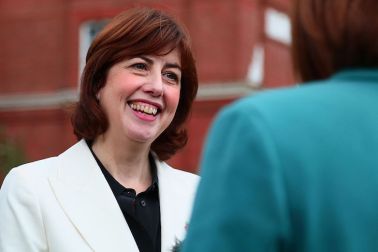Can the coalition survive the crises ahead?
For something cobbled together by eight sleep-deprived men over four days, the coalition agreement has proved remarkably durable. Even now, with relations between the Tories and Lib Dems arguably more strained than ever, the document’s writ still runs. Both parties know that if they didn’t abide by its terms, the show would collapse.
But the document can’t cover every crack, and the coalition has shown itself to be particularly vulnerable to events. In May last year no one expected, for instance, that there would be mass looting on the streets of London. When the riots happened, the coalition struggled to agree on a response: the two parties’ visceral reactions to the disturbances were just too different. With nothing in the coalition agreement to guide them, the government remains at odds over much of the post-riots debate.
In the coming weeks and months, we can expect plenty more divisive events. And each one will probably trigger the same thought in Liberal Democrat heads: what can we say or do to demonstrate that we are not the Conservatives and are ‘punching above our weight’ in government?
Nick Clegg’s new desire to set himself apart from his coalition partners can be seen in his decision to pick a public fight this week with Michael Gove, the Education Secretary. He wanted to show that his party had prevented the Conservatives’ new free schools from being the ‘preserve of the privileged few’. The result was to alienate one of the few Tory ministers who had remained favourably disposed to him. Clegg is now down to one Tory Cabinet ally: Ken Clarke.
The riots have heightened both parties’ sense of identity. Clegg’s office can barely contain a giggle when Cameron starts talking about health and safety in relation to the riots. They find it comic that there are people in No. 10 who say that rioters would have had much more difficulty had shop windows not been fitted with safety glass, which falls away in one piece.
But a far more serious division is over family policy. Iain Duncan Smith, the Work and Pensions Secretary, and Steve Hilton, Cameron’s senior adviser, both want to launch a massive parenting programme. They want the government to intervene and teach problem adults how to raise their children. But this is being blocked by the LibDem minister in charge of the matter, Sarah Teather. Cameron now has to decide whether or not to strip Teather of her powers. No. 10 has asked the victims’ commissioner, Louise Casey, to conduct a review into how family policy works across Whitehall. She is expected to conclude that the policy is going nowhere because it is spread across so many departments.
Handing over family policy in its entirety to Duncan Smith would be the simplest solution to this problem. The Lib Dems, though, would protest, wary of Duncan Smith’s social conservatism. But if Cameron doesn’t break this impasse, the government will not have a policy on one of the most important issues of the day.
The eurozone crisis is harder to prepare for, because it could erupt at any moment. Britain will probably be called upon to approve any solution, and this is the point where Cameron can name his price. He has already made clear in an interview with this magazine that he will seek to ‘maximise what we want in terms of our engagement with Europe’. But the Lib Dems, whose leadership remains instinctively pro-European, would try to limit the terms of any renegotiation.
Tory MPs are so alarmed by the prospect of Clegg blocking meaningful changes to Britain’s relationship with Brussels that they have begun to consider recruiting Labour MPs into a new Eurosceptic group. Their aim is to create for Cameron a Tory/Labour majority in favour of European reform, which would take the pro-European Lib Dems out of the equation. It is easy to see the appeal of this idea to Eurosceptic Labour MPs — they can reclaim powers and undermine the coalition at the same time.
But the big issue remains the economy. With growth in Europe and America having slowed to a near-halt, the case for a fresh stimulus is growing.
Just 4 per cent of the British public think the economy is in good shape, and just 10 per cent think their own lot will improve over the next year. Such pessimism is self-perpetuating. At this year’s Tory party conference it will be Osborne, not Cameron, delivering the most important speech.
In private, Tory MPs have started talking of the need for Osborne to ‘do a 2007 all over again’, a reference to his proposed inheritance tax cut, which scuttled Gordon Brown’s plans to call an election. Intriguingly, I understand that Andrew Cooper, head of strategy in Downing Street, has been discreetly canvassing opinion about the politics of a tax cut.
The Lib Dems would undoubtedly support one tax cut proposal: their idea of raising the income tax threshold to £10,000. It is already part of the coalition agreement and is being phased in over the life of the parliament. The introduction could be speeded up.
But the other measures that the Chancellor might pursue in a bid to kick-start the economy would not go down so well with his coalition partners. The Lib Dems are suspicious of the kind of radical deregulation that many in Numbers 10 and 11 now favour. They say that one of the Tories’ previous pushes against regulation almost led to the scrapping of restrictions on the sale of flammable children’s nightwear. Every bold Tory economic initiative looks certain to meet stern Lib Dem resistance.
The next few months will provide plenty of opportunities for pitched battles. But the country’s problems are such that this kind of fighting would be self-defeating for both parties. For now, at least, the interests of both Conservatives and Liberal Democrats would be better served by working with each other rather than against each other. This will mean rediscovering the spirit of co-operation that underpinned the coalition agreement.






Comments